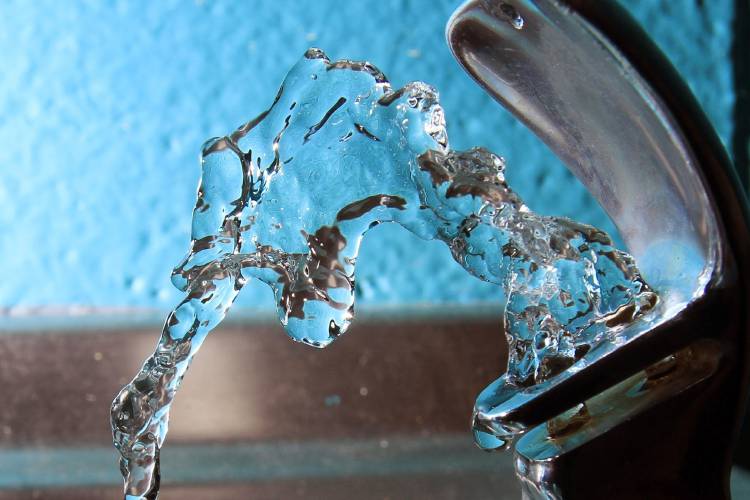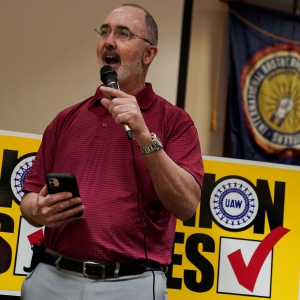Opinion: NH legislators must act to ban PFAS in consumer products

In this Friday Jan. 7, 2011, file photo, water flows from a water fountain at the Boys and Girls Club in Concord. Jim Cole/ AP File
| Published: 04-09-2024 6:00 AM |
Tom Irwin is vice president and director of CLF New Hampshire.
Each time we turn on the tap, we expect clean water. But in recent years, towns and cities across New Hampshire have discovered a dirty truth. Water in many communities has been tainted with toxic per- and poly-fluoroalkyl substances, otherwise known as PFAS or “forever chemicals.” Because of their widespread use in consumer, commercial, and industrial products, these dangerous and highly persistent chemicals are turning up everywhere — in public water supplies, private wells, and groundwater.
That’s why we must act now to protect our water, environment, and health. And it’s why legislators should pass HB 1649 to stop the spread of this pervasive pollution by banning PFAS in many consumer products sold in New Hampshire. With forever chemicals detected in air, soil, fish, and even human blood, passing such a law is critical to safeguarding public health and protecting our environment for future generations.
We live in a world awash with PFAS. First developed in the 1940s, these forever chemicals can be found in nonstick cookware, water-repellent clothing, stain-resistant fabrics, carpeting, upholstery, food paper wrappings, cosmetics, and foams used in firefighting. Even cribs and children’s booster seats can contain PFAS. So can laundry detergent sheets. They are in so many household products that, inevitably, these human-made chemicals (more than 14,000 to date) now contaminate our soil, water, air, and food. (PFAS have been found in a range of items in your grocery bag, including tea, pork chops, and peanut butter).
Not surprisingly, their omnipresence in consumer products also means PFAS are omnipresent in New Hampshire. In 2016, the city of Portsmouth had to shut down a public drinking water well after discovering high levels of PFAS. Forever chemicals emitted from Saint-Gobain’s Performance Plastics facility in Merrimack polluted that town’s air and private and public drinking water. Dover, Rochester, and Hampton have had their problems, too.
Contamination is so ubiquitous that PFAS, referred to as forever chemicals because they break down very slowly, have migrated even to areas far removed from where products containing the chemicals are being used and manufactured. Hundreds of wells in Merrimack, Londonderry, Bedford, Litchfield, and Hudson have been contaminated. Forever chemicals have also been found in surface waters, such as Berry Brook near the Coakley Landfill in North Hampton. In fact, researchers believe PFAS are in at least half the country’s tap water, although the numbers could be far higher.
Landfills are one major route by which these forever chemicals get into our environment. When textiles, food paper wrappings, and old furniture are dumped into landfills, they degrade. But what doesn’t degrade are PFAS that stick around to mix with the liquid leachate pooling at the bottom. The EPA has found PFAS in 95% of the landfill leachate they sampled across the country. This leachate is sent to wastewater treatment plants, most of which aren’t equipped to remove these toxic chemicals. The result? PFAS can be discharged from wastewater treatment plants into our rivers and bays, and they can become bound up in sewage sludge, which is then landfilled, incinerated, or even applied to land. The New Hampshire Department of Environmental Services’ PFAS Sampling Map reveals the scope of the problem.
Decades ago, there was no public awareness about these toxic chemicals. But that’s changed. Studies show that repeated ingestion of PFAS over a lifetime can cause serious cardiovascular, immunological, developmental, and reproductive disorders. Some suggest that PFAS may increase the risk of kidney and testicular cancer. Others link them to growth, learning, and behavioral problems in children. In women, they can cause problems with fertility and pregnancy. Developing fetuses and newborn babies are especially sensitive. These are intolerable risks, as we are still learning what the long-term effects may be. We cannot and should not forfeit our health and future to manufacturers who produce toxic substances that inflict permanent damage on our environment and our bodies.
Article continues after...
Yesterday's Most Read Articles
 Hometown Heroes: Couple’s sunflower fields in Concord reconnects the community to farming
Hometown Heroes: Couple’s sunflower fields in Concord reconnects the community to farming
 Boscawen resident takes issue with proposed town flag designs
Boscawen resident takes issue with proposed town flag designs
 Skepticism turns to enthusiasm: Concord Police welcome new social worker
Skepticism turns to enthusiasm: Concord Police welcome new social worker
 With new plan for multi-language learners, Concord School District shifts support for New American students
With new plan for multi-language learners, Concord School District shifts support for New American students
 With Concord down to one movie theater, is there a future to cinema-going?
With Concord down to one movie theater, is there a future to cinema-going?
 Opinion: The Concord School Board can restore trust with residents
Opinion: The Concord School Board can restore trust with residents
Currently before the NH Legislature, HB 1649 would prohibit the sale of many consumer products with intentionally added PFAS beginning in July 2028. This would include children’s products, furniture, carpets, cosmetics, fabrics, feminine hygiene products, fabric treatments, food packaging, and more.
With people’s health at risk and knowing that these chemicals build up in the environment and our bodies over time, a ban on PFAS-containing products in our state is not only warranted but long overdue. No one should be exposed to the hazards of dangerous forever chemicals when they turn on the tap, eat a meal, or even breathe. We can do something about the PFAS problem, and passing a ban on the sale of products with PFAS is the best way to get started. We will all breathe a little easier.


 Opinion: No, Republicans are not better on the economy
Opinion: No, Republicans are not better on the economy Opinion: Campus chaos and America’s character
Opinion: Campus chaos and America’s character Opinion: Learning from landscapes
Opinion: Learning from landscapes Opinion: Summer camp registration: The only thing higher than the price is the anxiety
Opinion: Summer camp registration: The only thing higher than the price is the anxiety
